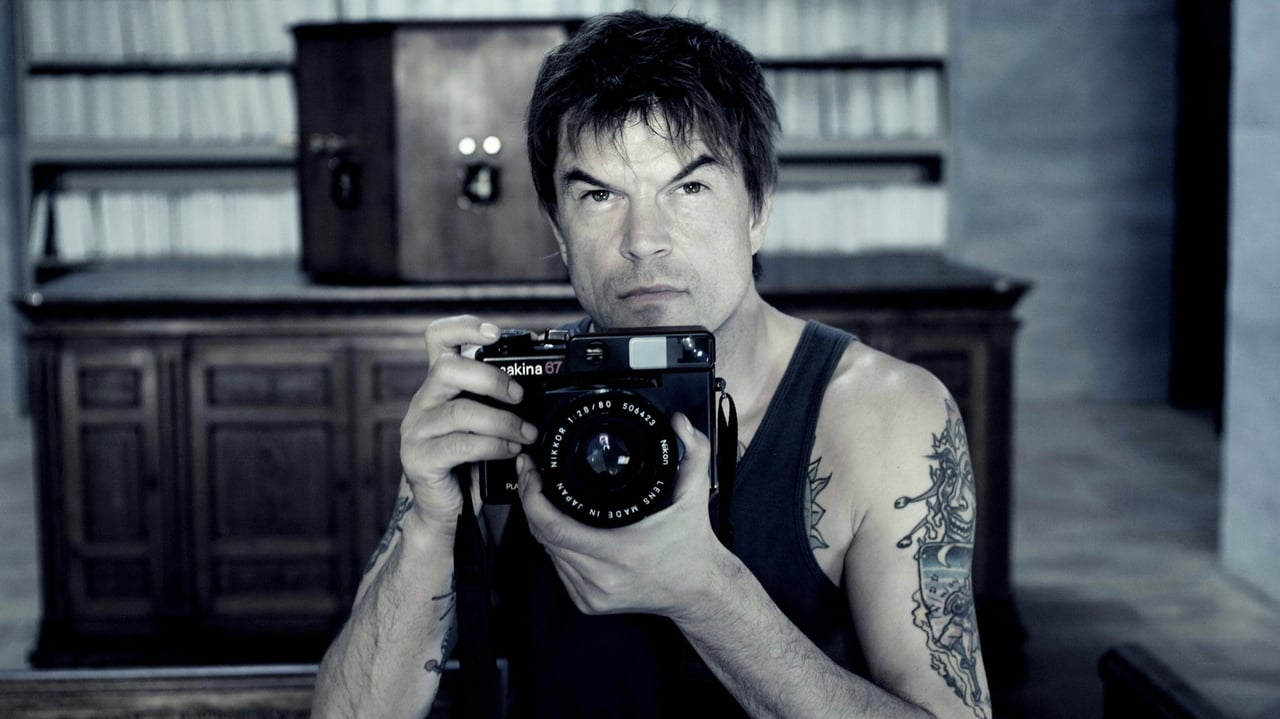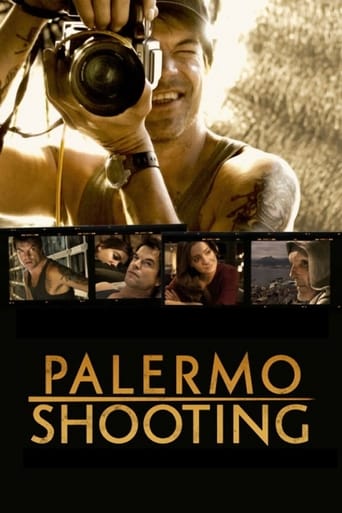

Most undeservingly overhyped movie of all time??
... View MoreThe film may be flawed, but its message is not.
... View MoreIt is a whirlwind of delight --- attractive actors, stunning couture, spectacular sets and outrageous parties.
... View MoreThis movie tries so hard to be funny, yet it falls flat every time. Just another example of recycled ideas repackaged with women in an attempt to appeal to a certain audience.
... View MoreI saw it yesterday at a late evening screening in Los Angeles with Wenders in-attendance, and he did an intro and stayed for a Q&A afterward (which ended at 1:30am!)I'd describe Palermo Shooting as an interesting failure, though with some good stuff in it. And not as a worst-ever film, or even as awful like some folks. Also interesting to me was how the naturalistic Wenders of "Paris, Texas" days has embraced modern CGI effects.Dennis Hopper, in his last role, was very good in a small but important supporting part in the very last scene of the film (don't walk out early or quit watching, cause you'd miss Hopper).It's kind of a 3 act play defining by its locations: Act 1. Dusseldorf, Act 2. Palermo, Act 3. Gangi.Not one of Wenders good ones. But if it had some editing-out of some of the more pretentious musing stuff, and general tightening-up, and a bit of clarification here and there, it could've been pretty good. Too bad...For a long and detailed plot summary, see the German Wikipedia page (worthwhile to do even putting up with Google Chrome's German-to-English translation.) It helped clarify a lot for me. de.wikipedia.org/wiki/Palermo_Shooting (Note: the English Wikipedia page was very minimal).
... View MoreSince I saw "Der Himmel über Berlin" approximately 3 years ago I've become a valid Vim Venders fan. After that day, I always thought, Wim Wenders had something original to say. Palermo Shooting hasn't changed my verdict, well... Almost. The Thing about Palermo Shooting that I guess, this movie tells the well known story with different methods. The methods that little bit um, shall we say cheesy? Of course, this doesn't mean that it's not a enjoyable movie. It's very "warm" movie after all. But despite all this "warmness", you think in somewhere, something/things is/are missing in this movie. Still, it's worth to watching.
... View MoreWenders' supreme quality as an author, to my view, is that he knows that his films are not so much about what images show, but about images themselves. This is his magic, and his curse. This is why i have a shelter in his films, and why so many increasingly misunderstand them (first reviews on this one show it will go to the same package). Wenders knows this, whenever he is making a film, he is reflecting on the nature of image, and how that affects vision, and how vision affects understanding, and how understanding affects meaning, and essence.Not few times, he addresses directly the theme, and embeds it in the plot of the film. This is such a case. Film about images. People who are about image. People who become the images they fetch. The very first scene makes it clear. It "frames" (how meaningful this word is with Wenders) a landscape, through a window of a building which is in itself all about framing. A pure volume full of square holes, all of them corresponding to a different frame, depending on moment you look, position, distance to the window. This building reflects the personality of the photographer, it is in itself a succession of frames, a closed capsule interlaced with partial views to the outside.Than we have a story about creating images. A character photographer who loses his soul because he becomes a faker, he forgets the essence, he no longer searches for a truth in the image, instead he creates his own fake truth. Fake Australian skies reflected on S.Paulo's windows, that kind of stuff. The introduction of Milla stands for this, as she is photographed 'artificially', and than transported to the "true" environment. Than the photographer retires, isolated, to a place he feels to be 'true' (a big port, Palermo means).Now the big things happen in Palermo.The woman. Her work is to recover images, it is to find the "truth" of images, it is to interpret the vision of somebody else. Those eyes of the painter, starring at the "camera", what he was seeing is what she wants to see. Check the oppositions, check how that fresco is worked on the film: detail versus global sight, understanding versus loosing the essence, long versus short. Check how the time of an image is understood. The woman takes years working on one image, the photographer produces thousands without understanding a single one.The Death. It's not the death, it's Dennis Hopper, and this matters. To see how Hopper was inserted in this project made the whole thing come clear to me, and it completed a portion of my film life that i now know was incomplete. Hopper is here the designated master framer, the man who observes life, who pulls strings (even though he is only doing his job). He is a superior agent, someone who is beyond and above all that we see. When people look at him, he looks back. He makes the record of all that, we see that, that metaphor of arrows, of "shooting" with a double meaning. So he is framed as much as he is a framer. Now, remember The American Friend. See that film before seeing this one if you can, it may strike you as 2 halves of the same idea, as it stroke me. Check how similar are the characters Hopper performs. There he was also the master framer, the manipulator behind the actions that we had. In fact he was manipulating a "framer" (literaly, a man who created frames for paintings). He used the framer as he provided the main "image". That film, which i consider essential, was all about the same game of images. Now we have an update, on how times changed (and with it changed deeply our relation to images) and how Wenders himself changed. Dennis Hopper is the connection, and his role is pivotal.Now, i believe that if you want to establish a successful relation to a creator you have to take his works for what they are. It's like loving beyond infatuation, like friendship beyond day to day chat. You have to enjoy the qualities and most important, acknowledge the flaws, and you have to live with that. That's my kind of relation with Wenders. His films in the last 10 years or so have become more and more on the verge of being an intellectual monologue, something you are supposed to sit and listen, and nod affirmatively with you head. That's something i won't tolerate with other filmmakers (Stone, Tarantino), but that i'm willing to put up with Wenders, because it matters to me what he has to say. If, like i did, you are able to put up with discursive dialogs, and the sensation that the man beyond the scenes is leading you to believe that he has the Truth, you may let this change your life. I did.A side quality you might appreciate is how music shapes the environment, regardless of the scenery. Wenders was also great in understanding this, now he does it with the aid of portable music. The music editing is greatMy opinion: 5/5http://www.7eyes.wordpress.com
... View MoreThis is easily Wim Wender's most pretentious movie to date, and that's saying a lot given that Wenders is perhaps the most pretentious director of his generation. There is so much symbolic Mumbo-Jumbo I don't know where to begin: Dungeons. Coffins. Dead people. Ghosts. Including Lou Reed as a black-and-white specter of himself. Flocks of sheep. A shape-shifting city skyline. Hooded strangers, shooting arrows and causing crashes. All of which I have seen before, and with more panache: In "Dark City", in Cronenberg's "Crash", Paul Auster's "Lulu on the Bridge", Tom Tykwer's "Winter Sleepers", even in TV's "Lost". I'm not even mentioning "The Devil's Advocate". At the height of his self-importance, Wenders has Dennis Hopper, in the part of Death himself, make a speech about the merits of analog photography. Sounds ridiculous? Go figure. But the weakest link is Wender's choice of Campino as photographer Finn Gilbert, the lead character. Campino, a German rock star in his day job, may be photogenic in an aging toy boy way, but an actor he sure is not. Anything he says sounds like a line from a script, and the script is weak enough to begin with. Wenders asks too much of him, and too little of his co-lead Giovanna Mezzogiornio, a fine actress restricted to sleepy smiles and sullen glances in this movie. Charming guest appearances by Jana Pallaske as a feisty arts student, Inga Busch as a sexy swimming instructor in Ugg boots and a bathing suit, and by the divine Milla Jovovich as her glamorous self. Nice enough soundtrack, featuring Bonnie Prince Billy, Nick Cave, and The Velvet Underground. Watch with your eyes closed.
... View More